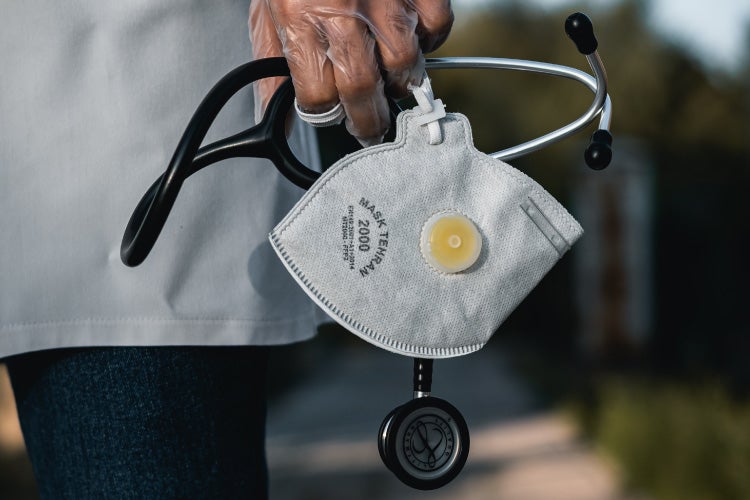News Feature: Healthcare and Coronavirus (Part 2)
Transcript of the podcast:
00:00 Speaker 1: Thank you for plugging into this Family Life news podcast. Streaming issues-driven, family-focused news.
00:07 Speaker 2: One of the challenges with this virus is that it's very similar, at least in some of the symptoms to the cold, to the flu, so it can be easily cloaked, or people might think, "Oh, I don't have anything." Then maybe they actually do have coronavirus but something that I found interesting, one of the NBA players that had been diagnosed with a positive test with Coronavirus, something that he had mentioned and others had chimed in saying, "You know, we've experienced the same thing too." Is that they lost their sense of smell. Is that possibly a sign of coronavirus?
00:41 Speaker 3: Yeah, so we are hearing reports of some patients who are experiencing loss of smell and/or taste because those two are closely related and we don't have significant data yet to say that this is across the board symptom of coronavirus. The American Academy of Otolaryngology-Head and Neck Surgery are asking that these are added to the list of symptoms so that people can be aware and maybe more prepared, but we also see these sensory losses in people with the common cold or sinusitis because inflammation or viral damage occurs in the upper respiratory system where we're seeing these viruses, but we're typically seeing this in the older populations and it is temporary, so it's seen but temporary.
01:22 S2: Piggybacking off of that though, we have heard that there are similar symptoms for sure with the cold and flu and obviously COVID-19 so are there some telltale signs that we could pick up on that okay, this is not just a simple cold, this is something more serious, like the COVID-19 virus.
01:41 S3: I think that people need to consider, first of all, were they exposed to anybody that tested positive? Were they quarantined properly, or did they put themselves at risk at all or were they at risk for any other reason going to work or whatever. Also, people should consider their own health patterns. So, for instance, if it's allergy season and somebody typically has allergies then they could decrease their exposure to the pollens or the allergen by closing windows, washing clothes and hair and seeing if those symptoms decrease. Kind of ruling out some other things before they think that it's COVID. With a cold, typically, we're going to see symptoms like nasal congestion and a sore throat, sometimes runny nose and the flu. While some of these common symptoms are the same as a COVID like fever, cough, or fatigue, the flu really has a much more sudden onset and people recover from it quicker, whereas the COVID has a gradual onset and typically more severe respiratory symptoms like the shortness of breath.
02:45 S3: So it's kind about, sometimes a rule-out to kind of look at those symptoms and see how fast they came on or how slow it came on. But it is important to note that from what we're seeing in most cases of COVID, about 85% of them, their mild and they can be treated at home with Tylenol for fever and some good hydration. So once people have ruled out some of these other things, it's best to just call their doctor and ask them how to proceed and if they need to come in and be seen.
03:11 S2: We've been able to go through a lot of these different signs and symptoms, ways to treat, ways to prevent that sort of thing. And so, I think the public is pretty well knowledgeable, thankfully, in ways to stay at home and protect themselves. Some of those things that you'd mentioned earlier but you being within the medical industry and being around healthcare, are there any other things that we should be concerned of regarding this illness or that might not be on our radar or aren't talked about right now that we should know?
03:41 S3: Yeah, Brandon, like you said, we are well-informed, people are learning fast and we still have a lot to learn about the disease because we're learning more every day through the studies that we're doing on COVID patients and how others have responded but I think moving forward in this kind of new normal, we're going to begin to hear about degrees that people had about what life was like before COVID, we're going to talk about the psychological impact of this experience, the social isolation, fear and anxiety that many will suffer.
04:11 S3: I think that's going to be a prominent discussion, but I think we'll also begin to talk about the positive outcomes from what we're experiencing right now. In our nursing programs at Spring Arbor University, we have over 1,100 students and 150 faculty who are all nurses and they're on the frontlines like you said through all of this. And we're hearing about the initial panic and stress from them, but we're also hearing how people are praying more, they're praying with their families, their patients, with each other, they're learning to reprioritize and to slow down, enjoying the moment. They're not taking things for granted. We're seeing communities band together delivering food and supplies to hospital staff and where they're able, nurses are watching each other’s kids so they can continue to work, neighbors are being better neighbors, families are learning to engage with each other again and we're just learning how to be patient, we're learning to be still. So I'm kind of hoping that these are the things we're going to start to see on our radar as we move forward.
05:08 S2: Absolutely, you've been over some great details once again Dr. Dawn Day with Spring Arbor University in Michigan. Thanks, so much for your time and for sharing this knowledge with us.
05:19 S3: Thank you, Brandon. It's my pleasure.
Click here to download the podcast.



